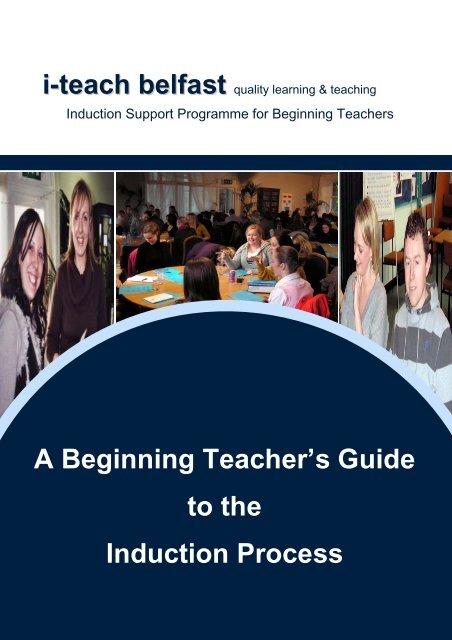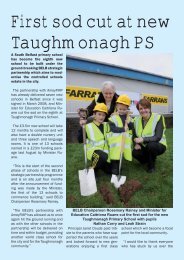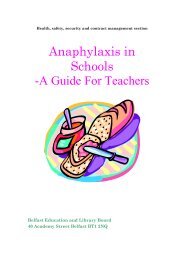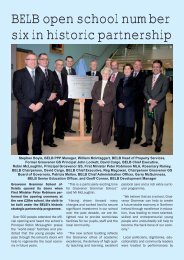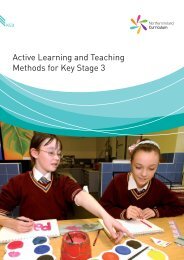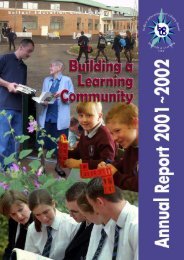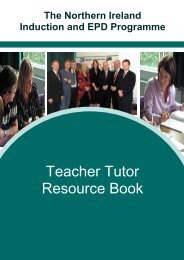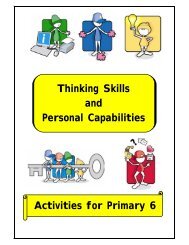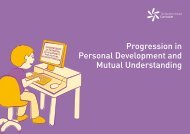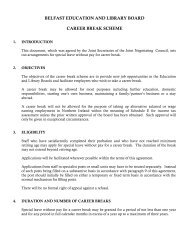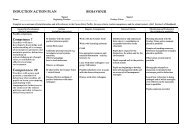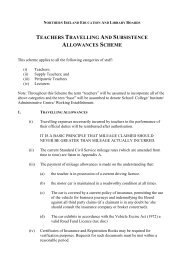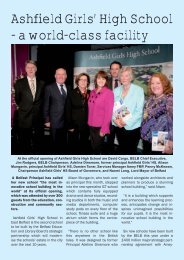A Beginning Teacher's Guide to the Induction Process i-teach belfast
A Beginning Teacher's Guide to the Induction Process i-teach belfast
A Beginning Teacher's Guide to the Induction Process i-teach belfast
Create successful ePaper yourself
Turn your PDF publications into a flip-book with our unique Google optimized e-Paper software.
i-<strong>teach</strong> <strong>belfast</strong> quality learning & <strong>teach</strong>ing<br />
<strong>Induction</strong> Support Programme for <strong>Beginning</strong> Teachers<br />
A <strong>Beginning</strong> Teacher’s <strong>Guide</strong><br />
<strong>to</strong> <strong>the</strong><br />
<strong>Induction</strong> <strong>Process</strong><br />
1<br />
BELB <strong>Induction</strong>/EPD Support Programme
<strong>Induction</strong> Support Programme for <strong>Beginning</strong> Teachers 2013-14<br />
‘At <strong>the</strong> heart of being a <strong>teach</strong>er is, above<br />
all else, being a learner – a lifelong<br />
learner. Only by being a learner will we<br />
be able <strong>to</strong> grow professionally and<br />
personally. To learn, one has <strong>to</strong> ask<br />
questions, of oneself and o<strong>the</strong>rs, and <strong>to</strong><br />
know that this process is valued and<br />
shared … Reflecting on <strong>teach</strong>ing<br />
provides a focus for analysing and<br />
developing learning and <strong>teach</strong>ing.’<br />
The Teacher Education Partnership Handbook<br />
(De, Aug 2010 edition, p 90)<br />
2<br />
A <strong>Beginning</strong> Teacher’s <strong>Guide</strong> <strong>to</strong> <strong>the</strong> <strong>Induction</strong> <strong>Process</strong><br />
July 2013 edition
<strong>Induction</strong> Support Programme for <strong>Beginning</strong> Teachers 2013-14<br />
Contents<br />
Welcome 04<br />
Introduction 05<br />
<strong>Induction</strong> Overview 06<br />
<strong>Induction</strong> Portfolio 08<br />
<strong>Induction</strong> Action Plans 13<br />
<strong>Induction</strong> Timetable 15<br />
Key Stage in <strong>Induction</strong> <strong>Process</strong> 16<br />
The Role of <strong>the</strong> Teacher Tu<strong>to</strong>r 17<br />
The Role of <strong>the</strong> Principal 18<br />
The Role of <strong>the</strong> School Governors 19<br />
The Role of <strong>the</strong> ELB 19<br />
Contacts 20<br />
What <strong>to</strong> do if … 21<br />
3<br />
A <strong>Beginning</strong> Teacher’s <strong>Guide</strong> <strong>to</strong> <strong>the</strong> <strong>Induction</strong> <strong>Process</strong><br />
July 2013 edition
<strong>Induction</strong> Support Programme for <strong>Beginning</strong> Teachers 2013-14<br />
Welcome<br />
4<br />
Congratulations on qualifying as a <strong>teach</strong>er. You have joined a profession which is<br />
not only exciting and challenging but also requires creativity and imagination. Your<br />
first year of <strong>teach</strong>ing can have a profound effect on your later career helping <strong>to</strong><br />
shape effective practice, establish appropriate expectations and develop <strong>the</strong> selfconfidence<br />
and self awareness necessary for good <strong>teach</strong>ing. As you worked through<br />
your Initial Teacher Training you will have received guidance and support and had<br />
opportunities <strong>to</strong> evaluate and reflect. During your first year on <strong>the</strong> job you will<br />
continue <strong>to</strong> do this as an integral feature of <strong>the</strong> <strong>Induction</strong> process.<br />
<strong>Induction</strong> is intended <strong>to</strong> help support you during your first year as a <strong>teach</strong>er in post. It<br />
aims <strong>to</strong> help you build on <strong>the</strong> knowledge and skills that you have already acquired<br />
during your Initial Teacher Training and lay <strong>the</strong> foundation for your Early<br />
Professional Development and Continuing Professional Development.<br />
This booklet is designed as a quick reference guide for <strong>Beginning</strong> Teachers,<br />
Teacher-Tu<strong>to</strong>rs, Principals and Boards of Governors. The information on <strong>the</strong> role of<br />
individuals and organisations relates directly <strong>to</strong> that contained within <strong>the</strong> ‘Teacher<br />
Education Partnership Handbook’ (DE, August 2010 edition). This handbook may<br />
be downloaded from:<br />
ei<strong>the</strong>r <strong>the</strong> ‘Teacher Professional Development’ page of <strong>the</strong> Department of<br />
Education’s website at: www.deni.gov.uk/index/<strong>teach</strong>ers-pg/4-<strong>teach</strong>ersprofessionaldevelopment_pg.htm<br />
or from <strong>the</strong> Regional <strong>Induction</strong> and EPD website for <strong>Beginning</strong> Teachers at:<br />
http://www.education-support.org.uk/<strong>teach</strong>ers/beginning<strong>teach</strong>ers/induction/induction-programme-requirements/<br />
A <strong>Beginning</strong> Teacher’s <strong>Guide</strong> <strong>to</strong> <strong>the</strong> <strong>Induction</strong> <strong>Process</strong><br />
July 2013 edition
<strong>Induction</strong> Support Programme for <strong>Beginning</strong> Teachers 2013-14<br />
Introduction<br />
In Nor<strong>the</strong>rn Ireland <strong>the</strong> <strong>teach</strong>er competence framework developed by <strong>the</strong> GTCNI and<br />
available in its publication, ‘Teaching: The Reflective Profession’, underpins<br />
<strong>teach</strong>er education and describes what <strong>teach</strong>ers should know, understand and be<br />
able <strong>to</strong> do at various stages in <strong>the</strong>ir career. The publication also contains a ‘Code of<br />
Values and Professional Practice’ for <strong>the</strong> <strong>teach</strong>ing profession in Nor<strong>the</strong>rn Ireland<br />
which sets out personal and professional attitudes and beliefs essential <strong>to</strong> <strong>the</strong><br />
development of <strong>teach</strong>ers as competent and reflective practitioners. These will<br />
underpin your <strong>Induction</strong> just as <strong>the</strong>y did your initial training and will continue <strong>to</strong> be<br />
developed throughout your <strong>teach</strong>ing career. The full list of competences is available<br />
<strong>to</strong> download from <strong>the</strong> GTCNI website at www.gtcni.org.uk and from <strong>the</strong> Regional<br />
<strong>Induction</strong> and EPD website for <strong>Beginning</strong> Teachers at:<br />
www.education-support.org.uk/<strong>teach</strong>ers/iepd/<br />
There are 4 interrelated stages in <strong>the</strong> development of <strong>the</strong>se competences:<br />
1. Initial - this stage is provided by <strong>the</strong> Higher Education Institutions (HEIs) in<br />
partnership with schools. A BT’s competence at <strong>the</strong> end of <strong>the</strong> initial stage is<br />
recorded in her/his Career-Entry Profile (CEP). The CEP provides a foundation<br />
for a continuing process of systematic reflection which underpins <strong>the</strong> professional<br />
development of <strong>Beginning</strong> Teachers in <strong>the</strong> <strong>Induction</strong> year<br />
2. <strong>Induction</strong> – <strong>the</strong> <strong>Induction</strong> stage is <strong>the</strong> next step in <strong>the</strong> continuum of <strong>teach</strong>er<br />
professional development which aims <strong>to</strong> build on and complement Initial Teacher<br />
Education and promote effective learning, <strong>teach</strong>ing and assessment practices.<br />
Support is provided by <strong>the</strong> Curriculum Advisory and Support Service (CASS) at<br />
5<br />
A <strong>Beginning</strong> Teacher’s <strong>Guide</strong> <strong>to</strong> <strong>the</strong> <strong>Induction</strong> <strong>Process</strong><br />
July 2013 edition
<strong>Induction</strong> Support Programme for <strong>Beginning</strong> Teachers 2013-14<br />
<strong>the</strong> Belfast Education and Library Board, or in <strong>the</strong> ELB in which you will be<br />
<strong>teach</strong>ing, in partnership with schools.<br />
3. Early Professional Development (EPD) - this stage (second and third years of<br />
<strong>teach</strong>ing) is provided by schools in partnership with CASS and o<strong>the</strong>r partnership<br />
organisations<br />
4. Continuing Professional Development (CPD) - this stage (throughout a<br />
<strong>teach</strong>er’s career) is provided by schools in partnership with CASS and o<strong>the</strong>r<br />
partner organisations<br />
<strong>Induction</strong> Overview<br />
6<br />
During <strong>the</strong> <strong>Induction</strong> stage, you are required <strong>to</strong>:<br />
<br />
<br />
<br />
<br />
<br />
<br />
register with <strong>the</strong> General Teaching Council for Nor<strong>the</strong>rn Ireland<br />
register online for <strong>Induction</strong> with <strong>the</strong> Education and Library Board in which<br />
you are ei<strong>the</strong>r employed or in which you live if you are not currently in post, at<br />
http://www.education-support.org.uk/<strong>teach</strong>ers/iepd<br />
register with <strong>the</strong> Nor<strong>the</strong>rn Ireland Substitute Teacher Register (NISTR) at<br />
https://www.nistr.org.uk/page.asp if you have not yet obtained a<br />
permanent post and wish <strong>to</strong> do substitute <strong>teach</strong>ing. It is important <strong>to</strong> note that<br />
schools are only able <strong>to</strong> employ <strong>teach</strong>ers as substitute <strong>teach</strong>ers who are<br />
registered on NISTR (Reference: Department of Education Circular 2006/07)<br />
link with your Teacher Tu<strong>to</strong>r in school<br />
participate in-service training<br />
Compile, in consultation with your Teacher Tu<strong>to</strong>r, an <strong>Induction</strong> portfolio<br />
containing evidence of:<br />
o<br />
planning, <strong>teach</strong>ing and reflection in relation <strong>to</strong> identified professional<br />
development needs on 2 personal action plans in <strong>the</strong> context of your<br />
A <strong>Beginning</strong> Teacher’s <strong>Guide</strong> <strong>to</strong> <strong>the</strong> <strong>Induction</strong> <strong>Process</strong><br />
July 2013 edition
<strong>Induction</strong> Support Programme for <strong>Beginning</strong> Teachers 2013-14<br />
o<br />
Career Entry Profile, <strong>the</strong> GTCNI <strong>teach</strong>er competences and <strong>the</strong> school<br />
development plan<br />
your ongoing holistic professional development<br />
The Education and Library Board takes <strong>the</strong> lead in providing a comprehensive<br />
programme of training and support aimed at assisting you in your ongoing<br />
development of <strong>the</strong> competences, skills and knowledge required <strong>to</strong> enable you <strong>to</strong><br />
achieve success as an experienced <strong>teach</strong>er in Belfast and lay <strong>the</strong> foundations for<br />
your future career. By helping <strong>Beginning</strong> Teachers <strong>to</strong> achieve <strong>the</strong>ir full potential <strong>the</strong><br />
<strong>Induction</strong> programme not only supports <strong>the</strong> Board’s vision of providing ‘a system of<br />
education which focuses on <strong>the</strong> needs of learners’ but also feeds in<strong>to</strong> <strong>the</strong><br />
Department of Education’s School Improvement Policy, ‘Every School a Good<br />
School’ (DE, April 2009) which specifies ‘high quality <strong>teach</strong>ing and learning’ as one<br />
of four key characteristics of a good school.<br />
Your school will also provide guidance and support on planning, opportunities for<br />
classroom observation and regular feedback on practice. It is important <strong>to</strong> remember<br />
that just as you will learn from <strong>the</strong> wisdom and knowledge of experienced colleagues<br />
so <strong>the</strong> school will also benefit from your skills, enthusiasm, creativity and<br />
imagination. The colleagues who will support you in school will be your Teacher<br />
Tu<strong>to</strong>r, your Head of Department, or Head of Key Stage, your Principal and/or Vice<br />
Principal. This links in closely with <strong>the</strong> Department of Education’s goal in relation <strong>to</strong><br />
quality <strong>teach</strong>ing which is:<br />
‘To work with <strong>teach</strong>ers, those who support <strong>teach</strong>ers and those who<br />
represent <strong>the</strong>ir interests <strong>to</strong> ensure that our <strong>teach</strong>ing profession is<br />
equipped and empowered <strong>to</strong> deliver <strong>the</strong> highest quality <strong>teach</strong>ing that<br />
helps every young person <strong>to</strong> reach her or his potential.’<br />
Every School A Good School, p 22 (DE, April 2009)<br />
7<br />
A <strong>Beginning</strong> Teacher’s <strong>Guide</strong> <strong>to</strong> <strong>the</strong> <strong>Induction</strong> <strong>Process</strong><br />
July 2013 edition
<strong>Induction</strong> Support Programme for <strong>Beginning</strong> Teachers 2013-14<br />
The <strong>Induction</strong> Portfolio<br />
<strong>Induction</strong> Portfolio<br />
The Teacher e-Portfolio Working Group for Nor<strong>the</strong>rn Ireland defines a portfolio as:<br />
‘A collection of au<strong>the</strong>ntic and diverse evidence of <strong>teach</strong>ing competence that<br />
has been <strong>the</strong> subject of reflection, syn<strong>the</strong>sis and selection for presentation<br />
<strong>to</strong> a professional audience for professional purposes.’<br />
Teacher e‐Portfolio Project for Nor<strong>the</strong>rn Ireland<br />
http://www.tepni.com<br />
This is similar <strong>to</strong> <strong>the</strong> DfES definition which defines a portfolio as:<br />
‘… a confidential and voluntary collection of material that records and reflects<br />
your work. It is a way of using past experiences and present activities <strong>to</strong><br />
demonstrate and reflect on skills learnt, <strong>to</strong> identify future learning needs and<br />
priorities and <strong>to</strong> inform and plan prospective development. It provides a<br />
mechanism, <strong>to</strong>ge<strong>the</strong>r with performance review, for thinking about your<br />
practice in a planned and systematic way.’<br />
DfES: Guidance on Producing a Professional Development Record<br />
www.dfes.gov.uk/<strong>teach</strong>ers/professional_development<br />
www.<strong>teach</strong>ernet.gov.uk/professionaldevelopment<br />
Portfolio Purpose<br />
The main purposes of your portfolio are <strong>the</strong>refore <strong>to</strong> provide you with a forum <strong>to</strong>:<br />
Present evidence of completion of <strong>the</strong> required elements of <strong>the</strong> <strong>Induction</strong> process<br />
including classroom based action plan activities<br />
illustrate how you reflect on your practice and ‘continue <strong>to</strong> improve as an<br />
effective adaptable practitioner, not only within, but beyond <strong>the</strong> classroom’<br />
through involvement in o<strong>the</strong>r professional development activities and experiences.<br />
This has been highlighted as a priority by <strong>the</strong> Education and Training Inspec<strong>to</strong>rate<br />
(ETI) in its Evaluative Commentary ‘The Language of Learning’ on <strong>the</strong> promotion<br />
of Literacy and Numeracy by <strong>teach</strong>ers in Initial Teacher Education (p 7, May 2011)<br />
and also in its ‘Evaluation of <strong>the</strong> <strong>Induction</strong> Programme for <strong>Beginning</strong> Teachers (s<br />
1.1, p 1, Nov 2011)<br />
8<br />
A <strong>Beginning</strong> Teacher’s <strong>Guide</strong> <strong>to</strong> <strong>the</strong> <strong>Induction</strong> <strong>Process</strong><br />
July 2013 edition
<strong>Induction</strong> Support Programme for <strong>Beginning</strong> Teachers 2013-14<br />
Portfolio Presentation Format<br />
You may present your<br />
portfolio in hard copy ‘Word’<br />
format or in electronic format.<br />
The hard copy framework is<br />
available <strong>to</strong> download from <strong>the</strong><br />
‘<strong>Induction</strong> Programme<br />
Requirements’ page of <strong>the</strong><br />
regional <strong>Induction</strong> and EPD<br />
website at:<br />
http://www.education-support.org.uk/<strong>teach</strong>ers/beginning<strong>teach</strong>ers/induction/induction-programme-requirements/<br />
The ‘Word’ version of <strong>the</strong> framework contains file dividers and proformas for all of <strong>the</strong><br />
<strong>Induction</strong> forms including <strong>the</strong> Action Plan and reflective logs.<br />
Just as many BTs will have already used e-portfolio processes during <strong>the</strong>ir <strong>teach</strong>er<br />
training in Nor<strong>the</strong>rn Ireland <strong>to</strong> complete aspects of coursework and <strong>the</strong>ir Formative and<br />
Career Entry Profiles online, so <strong>to</strong>o <strong>the</strong> option is available <strong>to</strong> continue using <strong>the</strong> secure<br />
PebblePad e-portfolio system in <strong>Induction</strong> (www.pebblepad.co.uk/tepni) as part of <strong>the</strong><br />
ongoing Nor<strong>the</strong>rn Ireland Teacher e-Portfolio Project (Te-PNI). This DE promoted<br />
project features prominently in <strong>the</strong> Teacher Education Review 1 as <strong>the</strong> way forward for<br />
<strong>teach</strong>ers <strong>to</strong> map and evidence <strong>the</strong>ir career wide professional development in one place.<br />
There is a direct link <strong>to</strong> <strong>the</strong> Te-PNI PebblePad website from <strong>the</strong> same ‘<strong>Induction</strong><br />
Programme Requirements’ page of <strong>the</strong> NIELB website.<br />
The PebblePad ‘e‐portfolio’ system contains online versions of all of <strong>the</strong> <strong>Induction</strong><br />
forms and reports, including <strong>the</strong> Action Plan and <strong>the</strong> Interim and Summative Reports as<br />
well as classroom observation proformas for optional Teacher Tu<strong>to</strong>r use and an<br />
<strong>Induction</strong> webfolio template for optional BT use. The system also offers a range of slick<br />
<strong>to</strong>ols <strong>to</strong> help your BT scaffold <strong>the</strong>ir reflections and log <strong>the</strong>ir experiences and<br />
professional development in a variety of creative and alternative ways <strong>to</strong> proformas in<br />
‘Word’ format, through, for example, ‘Blog, Thought, Activity’ and ‘Experience’ <strong>to</strong>ols.<br />
9<br />
1 (http://www.deni.gov.uk/index/<strong>teach</strong>ers-pg/4-<strong>teach</strong>ers-<strong>teach</strong>ereducationreview_pg.htm)<br />
A <strong>Beginning</strong> Teacher’s <strong>Guide</strong> <strong>to</strong> <strong>the</strong> <strong>Induction</strong> <strong>Process</strong><br />
July 2013 edition
<strong>Induction</strong> Support Programme for <strong>Beginning</strong> Teachers 2013-14<br />
Usernames and passwords issued during Initial Teacher Training will follow <strong>the</strong><br />
<strong>teach</strong>er through <strong>to</strong> <strong>the</strong> <strong>Induction</strong> stage and beyond.<br />
The following suggested portfolio framework is offered <strong>to</strong> you as a possible way <strong>to</strong><br />
structure your portfolio of evidence, whe<strong>the</strong>r in printed ‘Word’ format or in e-portfolio<br />
format. You should feel free <strong>to</strong> personalise and adapt it for your own use while<br />
taking care <strong>to</strong> ensure that <strong>the</strong> end product contains evidence of <strong>the</strong> core <strong>Induction</strong><br />
requirements of action planning and reflective practice.<br />
Suggested <strong>Induction</strong> Portfolio Framework<br />
10<br />
<br />
<br />
Section 1: Personal/School Profile<br />
o<br />
o<br />
o<br />
Personal Details<br />
Career Entry Profile – <strong>the</strong> evaluation of <strong>the</strong> <strong>Induction</strong> programme for<br />
<strong>Beginning</strong> Teachers (ETI, Nov 2011, p 7), has stressed <strong>the</strong> importance for<br />
BTs ‘<strong>to</strong> adapt <strong>the</strong> CEP <strong>to</strong> <strong>the</strong> circumstances of <strong>the</strong>ir post and take<br />
responsibility for <strong>the</strong>ir own professional learning’<br />
School Details – information on <strong>the</strong> school(s) in which you are carrying<br />
out your <strong>Induction</strong> and a brief description of your <strong>teach</strong>ing remit<br />
Section 2: Continuing Professional Development during <strong>Induction</strong><br />
o<br />
o<br />
o<br />
A Record of Professional Development during <strong>Induction</strong><br />
A Record of Extra-Curricular Involvement during <strong>Induction</strong><br />
A Classroom Observation Log with notes of observations of o<strong>the</strong>r<br />
<strong>teach</strong>ers in your own and/or in o<strong>the</strong>r schools, where applicable<br />
Section 3: <strong>Induction</strong> Action Plan 1<br />
o<br />
Planning for Teaching<br />
‣ Consideration should ideally be given <strong>to</strong> professional development<br />
targets arising out of your Career Entry Profile and/or school, key stage<br />
or departmental priorities when deciding on an ‘Area for Development’<br />
‣ 2 supporting examples of evidence of planning and preparation which<br />
relate <strong>to</strong> your chosen ‘Area for Development’, e.g.:<br />
Lesson plans for observed lessons<br />
Associated planners/schemes/units of work<br />
A <strong>Beginning</strong> Teacher’s <strong>Guide</strong> <strong>to</strong> <strong>the</strong> <strong>Induction</strong> <strong>Process</strong><br />
July 2013 edition
<strong>Induction</strong> Support Programme for <strong>Beginning</strong> Teachers 2013-14<br />
o<br />
o<br />
o<br />
o<br />
Teaching and Learning Support Materials<br />
NB: Supporting evidence of planning may be included as attachments in<br />
hard copy portfolio format or as hyperlinks in e-portfolio format<br />
Teaching for Learning<br />
‣ Reflective self-evaluation of lessons, e.g.<br />
Lessons observed by your Teacher Tu<strong>to</strong>r, Principal or o<strong>the</strong>r<br />
recognised supporting <strong>teach</strong>er<br />
A lesson taught at <strong>the</strong> start and one at <strong>the</strong> end of your action plan<br />
‣ Written observation feedback from your Teacher Tu<strong>to</strong>r, Principal or<br />
o<strong>the</strong>r recognised supporting <strong>teach</strong>er using appropriate observation<br />
proforma. Lessons observed should relate <strong>to</strong> <strong>the</strong> ‘Area for<br />
Development’ on your action plan<br />
‣ 3 supporting samples of pupils’ work which illustrate pupil achievement<br />
against <strong>the</strong> success criteria and any challenges encountered<br />
NB: The e-portfolio system easily facilitates and supports <strong>the</strong> inclusion of<br />
digital evidence of pupils’ work such as pho<strong>to</strong>s, videos etc<br />
A Summative Self-Evaluation of Action Plan 1 in which you should use<br />
<strong>the</strong> evidence and information ga<strong>the</strong>red from <strong>the</strong> moni<strong>to</strong>ring process <strong>to</strong><br />
make judgements about your <strong>teach</strong>ing in <strong>the</strong> context of your ‘Area for<br />
Development’ and <strong>to</strong> ascertain <strong>the</strong> extent <strong>to</strong> which <strong>the</strong> success criteria<br />
have been achieved<br />
A Summative Self-Reflection on Action Plan 1 focusing on what you<br />
feel you have learned about yourself as a <strong>teach</strong>er and your own<br />
professional development while working through your first action plan in<br />
terms of skills developed, knowledge fur<strong>the</strong>red and needs identified etc<br />
The <strong>Induction</strong> Interim Review Report which should be completed at <strong>the</strong><br />
end of Action Plan 1 as an outcome of joint discussion between yourself<br />
and your Teacher Tu<strong>to</strong>r with reference <strong>to</strong> <strong>the</strong> action plan and <strong>the</strong> GTCNI<br />
Competences, Code of Values and Professional Practice. The Interim<br />
Report should highlight your areas of strength and areas for continuing<br />
professional development<br />
11<br />
A <strong>Beginning</strong> Teacher’s <strong>Guide</strong> <strong>to</strong> <strong>the</strong> <strong>Induction</strong> <strong>Process</strong><br />
July 2013 edition
<strong>Induction</strong> Support Programme for <strong>Beginning</strong> Teachers 2013-14<br />
Section 4: <strong>Induction</strong> Action Plan 2<br />
The ‘Area for Development’ for this second action plan may emerge from<br />
<strong>the</strong> outcomes of <strong>the</strong> summative evaluation and reflection process of Action<br />
Plan 1 or may focus on an entirely different professional development<br />
need, ideally one emerging, as before, from targets identified<br />
in your Career Entry Profile and/or in school, key stage or departmental<br />
priorities<br />
The same evidence should be included as for Action Plan 1, as detailed<br />
above under <strong>the</strong> headings of:<br />
‣ Planning for Teaching<br />
‣ Teaching for Learning<br />
‣ Summative Self-Evaluation of Action Plan 2<br />
‣ Summative Self-Reflection on Action Plan 2<br />
Section 5: Completion of <strong>Induction</strong><br />
The Summative Report on <strong>Induction</strong> should be completed at <strong>the</strong> end of<br />
<strong>the</strong> <strong>Induction</strong> stage as an outcome of joint discussion between yourself,<br />
your Teacher Tu<strong>to</strong>r and Principal with reference <strong>to</strong> your holistic<br />
professional development and action planning. This report will highlight<br />
your achievements and areas of strength, areas for continuing professional<br />
development and interim plans for EPD<br />
Letter of Completion of <strong>Induction</strong> - this letter is signed by <strong>the</strong> Principal<br />
and <strong>the</strong> Chair of <strong>the</strong> Board of Governors in <strong>the</strong> school in which you will<br />
have completed <strong>the</strong> <strong>Induction</strong> programme. The letter should be sent by<br />
<strong>the</strong> school <strong>to</strong> <strong>the</strong> GTCNI <strong>to</strong> confirm your successful completion of<br />
<strong>Induction</strong>, a copy should be given <strong>to</strong> you and a fur<strong>the</strong>r copy sent <strong>to</strong> <strong>the</strong><br />
<strong>Induction</strong>/EPD team at <strong>the</strong> BELB or appropriate ELB<br />
12<br />
A <strong>Beginning</strong> Teacher’s <strong>Guide</strong> <strong>to</strong> <strong>the</strong> <strong>Induction</strong> <strong>Process</strong><br />
July 2013 edition
<strong>Induction</strong> Support Programme for <strong>Beginning</strong> Teachers 2013-14<br />
<strong>Induction</strong> Action Plans<br />
<strong>Induction</strong> Action Plans<br />
The action planning process, as highlighted in figure 1 below, is carried out twice<br />
during <strong>the</strong> <strong>Induction</strong> stage.<br />
Area for<br />
Development<br />
Focus<br />
What do you want<br />
<strong>to</strong> develop in<br />
respect of your<br />
<strong>teach</strong>ing<br />
Competence(s)<br />
Which GTCNI<br />
<strong>teach</strong>er<br />
competence(s) are<br />
you going <strong>to</strong> target<br />
Success<br />
Criteria<br />
Actions<br />
(including<br />
timescales)<br />
Support<br />
Arrangements<br />
Moni<strong>to</strong>ring<br />
(including evidence<br />
in portfolio)<br />
Evaluation<br />
Evaluation is about using <strong>the</strong> evidence and information you have ga<strong>the</strong>red from <strong>the</strong><br />
moni<strong>to</strong>ring process <strong>to</strong> make judgements about your Area for Development and <strong>to</strong><br />
ascertain <strong>the</strong> extent <strong>to</strong> which your success criteria have been achieved<br />
Self-Reflection<br />
What have you learned about yourself and your own professional development To<br />
what extent did <strong>the</strong> action plan help you <strong>to</strong> fur<strong>the</strong>r your professional knowledge, skills<br />
and understanding and identify o<strong>the</strong>r needs and areas for professional development<br />
Figure 1: <strong>Induction</strong> Action Plan Structure<br />
Action planning is designed <strong>to</strong> help you:<br />
set appropriate professional targets for yourself through <strong>the</strong> selection of an<br />
‘Area for Development’ mapped against appropriate GTCNI competences<br />
e.g. ‘Classroom Management’, ‘Use of a Range of Teaching Strategies and<br />
Resources’, ‘Effective use of ICT’, ‘Effective Questioning’<br />
identify appropriate success criteria for your ‘Area for Development’<br />
assess <strong>the</strong> quality of provision within your classroom and plan appropriately<br />
for your pupils’ learning in discussion with your Teacher Tu<strong>to</strong>r, Head of Key<br />
Stage or Head of Department<br />
identify <strong>the</strong> actions and support arrangements you will take <strong>to</strong> help you plan<br />
and deliver <strong>the</strong> lessons associated with your action plan<br />
13<br />
A <strong>Beginning</strong> Teacher’s <strong>Guide</strong> <strong>to</strong> <strong>the</strong> <strong>Induction</strong> <strong>Process</strong><br />
July 2013 edition
<strong>Induction</strong> Support Programme for <strong>Beginning</strong> Teachers 2013-14<br />
moni<strong>to</strong>r <strong>the</strong> effectiveness of your action plan in a number of ways including<br />
obtaining observation feedback, ga<strong>the</strong>ring feedback from your pupils and<br />
evidence of <strong>the</strong>ir work in a variety of forms ranging from written work <strong>to</strong><br />
pho<strong>to</strong>graphs, videos and audio recordings etc, as appropriate<br />
evaluate your action plan by using <strong>the</strong> information and evidence you have<br />
ga<strong>the</strong>red from <strong>the</strong> moni<strong>to</strong>ring process <strong>to</strong> make judgements about your chosen<br />
‘Area for Development’ and determine <strong>the</strong> extent <strong>to</strong> which you have met your<br />
success criteria and made a positive impact on pupils’ learning<br />
engage in a process of self reflection upon completion of your action plan<br />
evaluation <strong>to</strong> determine what you have learned about yourself and your own<br />
professional development, e.g. What skills did you exhibit/develop To what<br />
extent did <strong>the</strong> process help you <strong>to</strong> expand your own professional knowledge<br />
and understanding and identify fur<strong>the</strong>r areas for professional development<br />
Action planning should <strong>the</strong>refore be seen as an<br />
integral part of your <strong>teach</strong>ing and as a <strong>to</strong>ol <strong>to</strong> help<br />
you, with <strong>the</strong> support of your Teacher Tu<strong>to</strong>r,<br />
develop your classroom practice and engage in <strong>the</strong><br />
systematic and important process of self<br />
evaluation, self assessment and capacity building.<br />
Such a process of self reflection is viewed by <strong>the</strong><br />
Department of Education as an important indica<strong>to</strong>r<br />
of its school improvement policy which requires<br />
‘<strong>teach</strong>ers [<strong>to</strong>] reflect on <strong>the</strong>ir own work and <strong>the</strong><br />
outcomes of individual pupils.’ (‘Every School A<br />
Good School’, p 15). This review process will<br />
help you <strong>to</strong> decide what evidence of your action<br />
planning and reflective practice should go in<strong>to</strong> your <strong>Induction</strong> Portfolio.<br />
14<br />
A <strong>Beginning</strong> Teacher’s <strong>Guide</strong> <strong>to</strong> <strong>the</strong> <strong>Induction</strong> <strong>Process</strong><br />
July 2013 edition
<strong>Induction</strong> Support Programme for <strong>Beginning</strong> Teachers 2013-14<br />
Term 1<br />
Assessment meeting 1 with<br />
<strong>the</strong> <strong>Induction</strong> Teacher Tu<strong>to</strong>r<br />
and/or Principal<br />
Develop Action Plan 1. This<br />
may continue in<strong>to</strong> term 2<br />
Development of portfolio.<br />
Evidence of professional<br />
development should be kept<br />
by <strong>the</strong> <strong>Beginning</strong> Teacher<br />
Term 2<br />
Develop Action Plan 2. This<br />
may continue in<strong>to</strong> term 3<br />
Development of portfolio.<br />
Evidence of professional<br />
development should be kept<br />
by <strong>the</strong> <strong>Beginning</strong> Teacher<br />
Term 3<br />
Summative Report<br />
Outcome of professional<br />
development during <strong>Induction</strong><br />
which indicates possible focus<br />
for Early Professional<br />
Development.<br />
Successful Completion of<br />
<strong>Induction</strong><br />
Confirmation from Board of<br />
Governors on<br />
recommendation of <strong>the</strong><br />
Principal. A copy of <strong>the</strong> letter<br />
of completion of <strong>Induction</strong><br />
should be:<br />
Given <strong>to</strong> <strong>the</strong> <strong>Beginning</strong><br />
Teacher;<br />
Retained by <strong>the</strong> school;<br />
Forwarded <strong>to</strong>:<br />
The GTCNI;<br />
The <strong>Induction</strong>/EPD<br />
Team at <strong>the</strong> local ELB<br />
The <strong>Induction</strong> Timetable<br />
Support and Moni<strong>to</strong>ring<br />
Select targets for <strong>Induction</strong> based on <strong>the</strong><br />
CEP, <strong>the</strong> GTCNI <strong>teach</strong>er competences and<br />
<strong>the</strong> school context<br />
Select Area for Development for Action<br />
Plan 1<br />
Pre observation 1 meeting <strong>to</strong> discuss focus<br />
for <strong>the</strong> observation<br />
Observation 1 of <strong>the</strong> <strong>Beginning</strong> Teacher<br />
and follow up discussion<br />
Pre observation 2 meeting <strong>to</strong> discuss focus<br />
for <strong>the</strong> observation<br />
Observation 2 of <strong>the</strong> <strong>Beginning</strong> Teacher<br />
and follow up discussion<br />
Meeting <strong>to</strong> review progress and action plan<br />
Interim Report<br />
Outcome of joint discussion referring <strong>to</strong><br />
Action Plan and <strong>teach</strong>er competences<br />
Select Area for Development for Action<br />
Plan 2<br />
Pre observation 3 meeting <strong>to</strong> discuss focus<br />
for <strong>the</strong> observation<br />
Observation 3 of <strong>the</strong> <strong>Beginning</strong> Teacher<br />
and follow up discussion<br />
Meeting <strong>to</strong> review progress and action plan<br />
Pre observation 4 meeting <strong>to</strong> discuss focus<br />
for <strong>the</strong> observation<br />
Observation 4 of <strong>the</strong> <strong>Beginning</strong> Teacher<br />
and follow up discussion<br />
Meeting <strong>to</strong> review progress and action plan<br />
Individualised<br />
Professional<br />
Development<br />
Programme<br />
designed for <strong>the</strong><br />
<strong>Beginning</strong><br />
Teacher, including<br />
for example:<br />
observation of<br />
experienced<br />
<strong>teach</strong>ers<br />
participation in<br />
working groups<br />
school focused<br />
INSET<br />
BELB<br />
professional<br />
development<br />
INSET<br />
Regional<br />
professional<br />
development<br />
INSET<br />
15<br />
The <strong>Induction</strong> Timetable<br />
A <strong>Beginning</strong> Teacher’s <strong>Guide</strong> <strong>to</strong> <strong>the</strong> <strong>Induction</strong> <strong>Process</strong><br />
July 2013 edition
<strong>Induction</strong> Support Programme for <strong>Beginning</strong> Teachers 2013-14<br />
Key Stages in <strong>the</strong> <strong>Induction</strong> <strong>Process</strong><br />
Career Entry Profile<br />
Used <strong>to</strong> promote career development by <strong>the</strong> <strong>Beginning</strong> Teacher with <strong>the</strong> Teacher Tu<strong>to</strong>r<br />
School <strong>Induction</strong> Programme<br />
To support <strong>the</strong> <strong>Beginning</strong> Teacher in <strong>the</strong> context of <strong>the</strong> school. The school registers <strong>the</strong><br />
<strong>Beginning</strong> Teacher with <strong>the</strong> ELB on uptake of post at any stage throughout <strong>the</strong> year<br />
ELB <strong>Induction</strong> Programme<br />
<strong>Beginning</strong> Teacher selects appropriate<br />
INSET in consultation with Teacher Tu<strong>to</strong>r<br />
Portfolio<br />
Evidence of professional development<br />
kept by <strong>the</strong> <strong>Beginning</strong> Teacher<br />
Action Plans<br />
To address specific needs<br />
Moni<strong>to</strong>ring and Evaluation<br />
Through support, discussion and<br />
classroom observation<br />
Interim Report<br />
Outcome of joint discussion referring <strong>to</strong> Action Plan and <strong>teach</strong>er competences<br />
Action Plans<br />
To address area(s) of continuing professional development<br />
Portfolio<br />
Evidence of professional development<br />
kept by <strong>the</strong> <strong>Beginning</strong> Teacher<br />
Moni<strong>to</strong>ring and Evaluation<br />
Through support, discussion and<br />
classroom observation<br />
Summative Report<br />
Outcome of professional development during <strong>Induction</strong> and identification of possible focus for<br />
Early Professional Development<br />
16<br />
Successful Completion of <strong>Induction</strong><br />
Confirmation from Board of governors on recommendation of <strong>the</strong> principal<br />
A copy of <strong>the</strong> ‘Completion of <strong>Induction</strong>’ letter is:<br />
given <strong>to</strong> <strong>the</strong> <strong>Beginning</strong> Teacher<br />
<br />
<br />
retained by <strong>the</strong> school<br />
forwarded <strong>to</strong>:<br />
o The General Teaching Council for Nor<strong>the</strong>rn Ireland, 3 rd Floor, Albany House, 73-<br />
75 Great Vic<strong>to</strong>ria Street, Belfast, BT2 7AF<br />
o<br />
The <strong>Induction</strong>/EPD Team at <strong>the</strong> local ELB<br />
Figure 3: The <strong>Induction</strong> <strong>Process</strong><br />
A <strong>Beginning</strong> Teacher’s <strong>Guide</strong> <strong>to</strong> <strong>the</strong> <strong>Induction</strong> <strong>Process</strong><br />
July 2013 edition
<strong>Induction</strong> Support Programme for <strong>Beginning</strong> Teachers 2013-14<br />
The Role of Teacher Tu<strong>to</strong>r<br />
Your Teacher Tu<strong>to</strong>r or recognised supporting <strong>teach</strong>er should carry out <strong>the</strong><br />
following in support of you through <strong>the</strong> <strong>Induction</strong> programme:<br />
coordinate, manage, moni<strong>to</strong>r and evaluate, in liaison with <strong>the</strong> Principal,<br />
your <strong>Induction</strong> programme in school<br />
be a firm advocate <strong>to</strong> all in authority on behalf of you<br />
provide guidance <strong>to</strong> o<strong>the</strong>r key members of staff in school who also<br />
support your development through <strong>the</strong> <strong>Beginning</strong> Teacher programme<br />
ensure that you register for <strong>Induction</strong><br />
get <strong>to</strong> know you personally and professionally<br />
create an open, supportive and challenging climate<br />
provide you with information which outlines, for example, school aims,<br />
routines, policies and procedures on Child Protection, Health and Safety<br />
and Special Educational Needs. Much of this information will be<br />
contained in <strong>the</strong> school’s staff handbook<br />
help you <strong>to</strong> identify your professional development needs within <strong>the</strong><br />
context of <strong>the</strong> school and <strong>the</strong> classes you <strong>teach</strong> and ensure that <strong>the</strong>se<br />
are supported effectively<br />
guide you in your choice of appropriate ‘Areas for Development’ for your<br />
<strong>Induction</strong> Action Plans<br />
support you in <strong>the</strong> planning process and in <strong>the</strong> selection and evaluation<br />
of sources of evidence<br />
moni<strong>to</strong>r and evaluate your progress through direct classroom observation<br />
of your work and provide you with regular feedback and suggestions for<br />
fur<strong>the</strong>r development<br />
support you, through observation and discussion, in <strong>the</strong> important<br />
process of review and reflection, encouraging you <strong>to</strong> reflect critically on<br />
your <strong>teach</strong>ing and on <strong>the</strong> quality of your pupils’ learning<br />
keep <strong>the</strong> Principal and o<strong>the</strong>r key members of staff informed of your<br />
progress<br />
recommend <strong>to</strong> <strong>the</strong> Principal, as appropriate, your successful completion<br />
of <strong>Induction</strong><br />
17<br />
A <strong>Beginning</strong> Teacher’s <strong>Guide</strong> <strong>to</strong> <strong>the</strong> <strong>Induction</strong> <strong>Process</strong><br />
July 2013 edition
<strong>Induction</strong> Support Programme for <strong>Beginning</strong> Teachers 2013-14<br />
The Role of <strong>the</strong> Principal<br />
The main responsibilities of <strong>the</strong> Principal in support of you as a <strong>Beginning</strong><br />
Teacher are <strong>to</strong>:<br />
raise whole staff awareness of <strong>the</strong> requirements of <strong>the</strong> <strong>Beginning</strong> Teacher<br />
Programme and of whole school responsibility <strong>to</strong> support you<br />
moni<strong>to</strong>r <strong>the</strong> <strong>Beginning</strong> Teacher programme in school <strong>to</strong> ensure high<br />
quality and consistent provision<br />
keep <strong>the</strong> Board of Governors informed of <strong>the</strong> support arrangements in<br />
place for you and any o<strong>the</strong>r <strong>Beginning</strong> Teachers in school<br />
ensure that <strong>the</strong>re are effective mechanisms in place <strong>to</strong> support you<br />
through <strong>the</strong> requirements of <strong>Induction</strong> in particular and as a member of <strong>the</strong><br />
staff team in general, e.g. adequate time and resources<br />
ensure that your Teacher Tu<strong>to</strong>r and o<strong>the</strong>r key staff have adequate time <strong>to</strong><br />
work with you and support you;<br />
facilitate your attendance at <strong>the</strong> ELB <strong>Induction</strong> INSET programme<br />
meet with you and your Teacher Tu<strong>to</strong>r <strong>to</strong> help you identify development<br />
needs and discuss your progress<br />
encourage you by taking a close interest in your work including your<br />
<strong>Induction</strong> portfolios<br />
consider <strong>the</strong> potential of dissemination of <strong>the</strong> outcomes of your <strong>Induction</strong><br />
work for <strong>the</strong> benefit of whole staff development in school<br />
countersign <strong>the</strong> <strong>Induction</strong> Interim Review and Summative Reports<br />
recommend <strong>to</strong> <strong>the</strong> Board of Governors, when appropriate, that you have,<br />
successfully completed <strong>the</strong> <strong>Induction</strong> stage and countersign <strong>the</strong> letter of<br />
completion with <strong>the</strong> Chair of <strong>the</strong> Board of Governors<br />
send a copy of <strong>the</strong> ‘Completion of <strong>Induction</strong>’ letter, when appropriate, <strong>to</strong><br />
<strong>the</strong> GTCNI, Albany House, 3rd Floor, 73-75 Great Vic<strong>to</strong>ria Street,<br />
Belfast, BT2 7AF and <strong>to</strong> <strong>the</strong> <strong>Induction</strong>/EPD Team at <strong>the</strong> BELB or <strong>the</strong><br />
ELB with which you are registered. A copy of <strong>the</strong> letter should also be<br />
given <strong>to</strong> you for your own records<br />
celebrate within <strong>the</strong> school your successful completion of <strong>the</strong> <strong>Induction</strong><br />
stage of <strong>the</strong> <strong>Beginning</strong> Teacher Programme<br />
18<br />
A <strong>Beginning</strong> Teacher’s <strong>Guide</strong> <strong>to</strong> <strong>the</strong> <strong>Induction</strong> <strong>Process</strong><br />
July 2013 edition
<strong>Induction</strong> Support Programme for <strong>Beginning</strong> Teachers 2013-14<br />
The Role of <strong>the</strong> Governors<br />
In order for <strong>the</strong> Board of Governors <strong>to</strong> confirm, or o<strong>the</strong>rwise, your<br />
successful completion of <strong>Induction</strong>, it will be important for <strong>the</strong>m <strong>to</strong>:<br />
be informed of <strong>the</strong> <strong>Induction</strong> support programme which is in place in<br />
school<br />
receive regular reports on your progress<br />
have access, if desired, <strong>to</strong> your <strong>Induction</strong> portfolio of evidence<br />
The Role of <strong>the</strong> <strong>the</strong> ELB<br />
19<br />
The Curriculum Advisory and Support Service (CASS)<br />
The Belfast Education and Library Board’s <strong>Induction</strong> and EPD team designs<br />
and delivers, in conjunction with o<strong>the</strong>r colleagues in <strong>the</strong> local and regional<br />
CASS teams, a dedicated programme of in-service training (INSET). You will<br />
also have access <strong>to</strong> Area of Learning officers who will take a pas<strong>to</strong>ral and<br />
professional interest in you and also help you <strong>to</strong> reflect on how <strong>the</strong> courses you<br />
attend, alongside your <strong>teach</strong>ing, help you <strong>to</strong> develop your confidence, skills and<br />
competence as a classroom practitioner. In summary, CASS will provide:<br />
a differentiated local programme of in-service training based on <strong>the</strong><br />
identified needs of BTs in each ELB area<br />
a coordinated regional in-service programme <strong>to</strong> meet <strong>the</strong> needs of BTs in<br />
primary, post-primary, special and nursery schools across all ELB areas<br />
A <strong>Beginning</strong> Teacher’s <strong>Guide</strong> <strong>to</strong> <strong>the</strong> <strong>Induction</strong> <strong>Process</strong><br />
July 2013 edition
<strong>Induction</strong> Support Programme for <strong>Beginning</strong> Teachers 2013-14<br />
school-based support <strong>to</strong> assist BTs in <strong>the</strong> implementation of <strong>the</strong> ‘plan,<br />
<strong>teach</strong>, review, reflect’ cycle<br />
provide opportunities <strong>to</strong> meet with o<strong>the</strong>r BTs<br />
school and centre-based training and support for Teacher-Tu<strong>to</strong>rs and<br />
Principals in <strong>the</strong> management and co-ordination of <strong>the</strong> <strong>Induction</strong><br />
programme including guidance on observing lessons and giving<br />
feedback<br />
guidance <strong>to</strong> schools with BTs who may require more intensive support<br />
support for <strong>teach</strong>ers re-entering <strong>the</strong> profession and also for <strong>teach</strong>ers who<br />
qualified outside Nor<strong>the</strong>rn Ireland<br />
Contacts<br />
Belfast Education and Library Board<br />
Ka<strong>the</strong>rine Jelly<br />
Nursery/Primary/<br />
Special<br />
Tel: 90 564189<br />
Fax: 90 564078<br />
ka<strong>the</strong>rine.jelly@belb.co.uk<br />
Gillian Stewart<br />
Nursery/Primary/Post<br />
Primary/Special<br />
Tel: 90 564304<br />
Fax: 90 564078<br />
gillian.stewart@belb.co.uk<br />
Regional <strong>Induction</strong> and EPD website:<br />
http://www.education-support.org.uk/<strong>teach</strong>ers/iepd/<br />
20<br />
A <strong>Beginning</strong> Teacher’s <strong>Guide</strong> <strong>to</strong> <strong>the</strong> <strong>Induction</strong> <strong>Process</strong><br />
July 2013 edition
<strong>Induction</strong> Support Programme for <strong>Beginning</strong> Teachers 2013-14<br />
What <strong>to</strong> do if …<br />
You are employed in<br />
a school for a year<br />
or more:<br />
What <strong>to</strong> do if …<br />
Ensure that you are registered for <strong>Induction</strong> with <strong>the</strong><br />
Education and Library Board in which <strong>the</strong> school is located<br />
Link with <strong>the</strong> school’s Teacher Tu<strong>to</strong>r and participate in <strong>the</strong><br />
CASS programme<br />
Draw up, in consultation with <strong>the</strong> Teacher Tu<strong>to</strong>r 2 personal<br />
action plans linked <strong>to</strong> your Career Entry Profile. These should<br />
be linked <strong>to</strong> your Career Entry Profile, classroom needs, core<br />
criteria and <strong>teach</strong>er competences<br />
Implement <strong>the</strong> <strong>Induction</strong> Action Plan<br />
Collect evidence of increasing professional competence in an<br />
<strong>Induction</strong> portfolio which should be presented, on request, <strong>to</strong><br />
<strong>the</strong> Principal and <strong>the</strong> Chair of <strong>the</strong> Board of Governors<br />
21<br />
You are employed<br />
for a period of at<br />
least 10 weeks:<br />
You are initially<br />
appointed as<br />
substitute <strong>teach</strong>ers<br />
for fewer than 4<br />
weeks but whose<br />
contracts are<br />
extended<br />
incrementally, at <strong>the</strong><br />
end of 4 weeks:<br />
You are involved in<br />
day <strong>to</strong> day<br />
substitute <strong>teach</strong>ing:<br />
Ensure that you are registered for <strong>Induction</strong> with <strong>the</strong><br />
Education and Library Board in which <strong>the</strong> school is located<br />
Link with <strong>the</strong> school’s Teacher Tu<strong>to</strong>r and participate in <strong>the</strong><br />
CASS programme as appropriate<br />
Draw up, in consultation with <strong>the</strong> Teacher Tu<strong>to</strong>r, 2 a personal<br />
action plans linked <strong>to</strong> your Career Entry Profile, classroom<br />
needs, core criteria and <strong>teach</strong>er competences<br />
<br />
<br />
Implement <strong>the</strong> <strong>Induction</strong> Action Plan<br />
Collect evidence of increasing professional competence in an<br />
<strong>Induction</strong> portfolio which should be presented <strong>to</strong> <strong>the</strong> Principal<br />
and <strong>the</strong> Chair of <strong>the</strong> Board of Governors<br />
Alert <strong>the</strong> Principal and/or Teacher Tu<strong>to</strong>r <strong>to</strong> your position and <strong>to</strong><br />
<strong>the</strong> need for discussion of <strong>Induction</strong> requirements, as<br />
appropriate, should <strong>the</strong> contract be extended<br />
Register with <strong>the</strong> Education and Library Board explaining your<br />
circumstances<br />
Compile a careful record of <strong>the</strong> range of <strong>teach</strong>ing experiences<br />
gained and a log of professional development activities<br />
engaged in including details of school and centre-based<br />
courses<br />
It is difficult for <strong>Beginning</strong> Teachers who are carrying out day-<strong>to</strong>day<br />
substitute <strong>teach</strong>ing <strong>to</strong> engage with <strong>the</strong> breadth of <strong>the</strong> <strong>teach</strong>er<br />
competence framework and <strong>to</strong> participate fully in <strong>the</strong> <strong>Induction</strong><br />
programme. However, in this situation you should:<br />
Register with <strong>the</strong> Education and Library Board where you live<br />
so that you can receive information about courses<br />
Keep a careful record of <strong>the</strong> range of <strong>teach</strong>ing experiences<br />
gained<br />
Keep a log of your development in relation <strong>to</strong> <strong>the</strong> core criteria<br />
and <strong>teach</strong>er competence framework with particular reference<br />
<strong>to</strong> demonstration of professional development<br />
A <strong>Beginning</strong> Teacher’s <strong>Guide</strong> <strong>to</strong> <strong>the</strong> <strong>Induction</strong> <strong>Process</strong><br />
July 2013 edition
<strong>Induction</strong> Support Programme for <strong>Beginning</strong> Teachers 2013-14<br />
Notes<br />
22<br />
A <strong>Beginning</strong> Teacher’s <strong>Guide</strong> <strong>to</strong> <strong>the</strong> <strong>Induction</strong> <strong>Process</strong><br />
July 2013 edition
“Teachers, like children and everyone<br />
else, feel <strong>the</strong> need <strong>to</strong> grow in <strong>the</strong>ir<br />
competences; <strong>the</strong>y want <strong>to</strong> transform<br />
experiences in<strong>to</strong> thoughts, thoughts and<br />
reflections, and reflections in<strong>to</strong> new<br />
thoughts and new actions.”<br />
Loris Malaguzzi<br />
Founder of <strong>the</strong> Reggio Emilia Approach <strong>to</strong> Early Education,<br />
1920-1994<br />
23<br />
BELB <strong>Induction</strong>/EPD Support Programme
i-<strong>teach</strong> <strong>belfast</strong><br />
Promoting effective learning and<br />
<strong>teach</strong>ing in schools through <strong>the</strong><br />
provision of proactive, high<br />
quality professional development<br />
opportunities for <strong>Beginning</strong><br />
Teachers and Teacher Tu<strong>to</strong>rs<br />
BELB, July 2013 Edition<br />
24<br />
BELB <strong>Induction</strong>/EPD Support Programme


